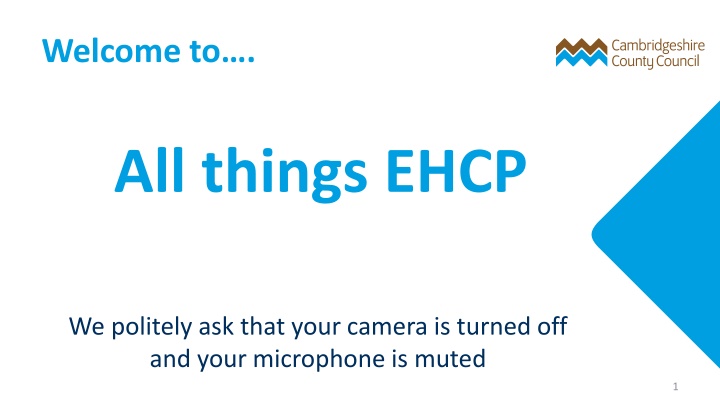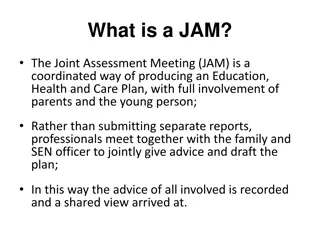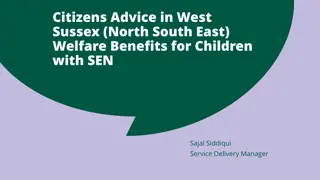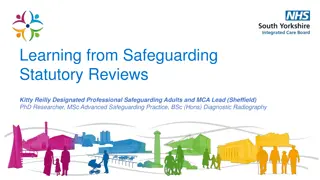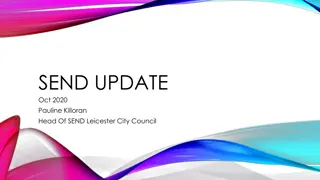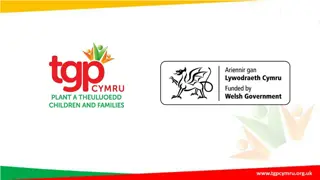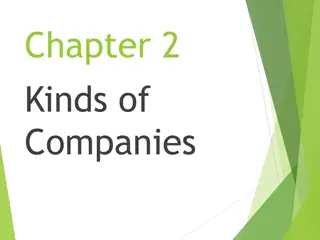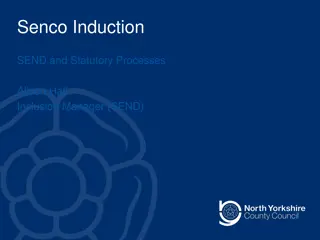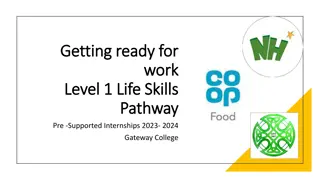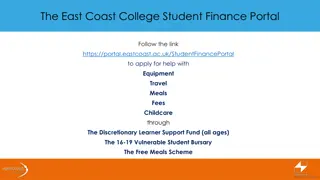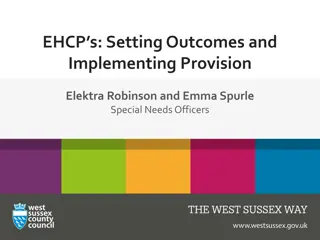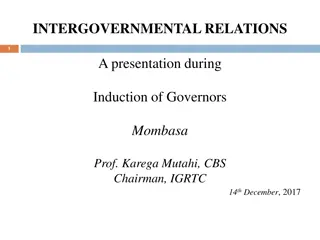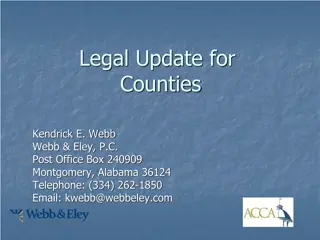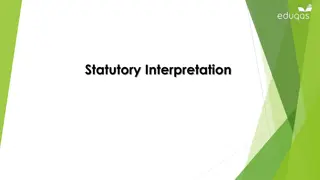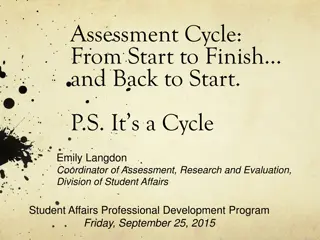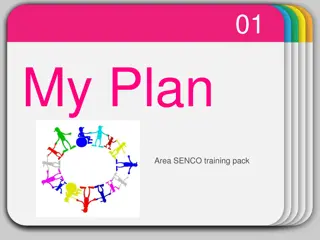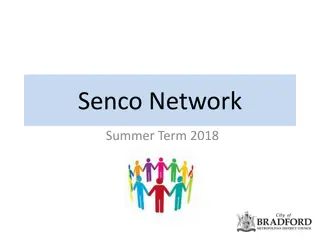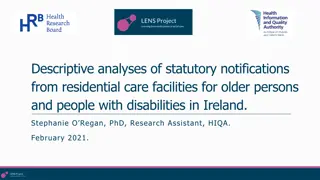Overview of EHCP Processes and Statutory Assessment Team
This content provides detailed information on EHCP processes, including the role of the Statutory Assessment Team, the number of EHCPs maintained over the years, and the responsibilities of Casework Officers in the assessment and review process. It covers the statutory assessment process, the involvement of professionals, and the decision-making timelines within the EHCP framework.
Uploaded on Aug 06, 2024 | 1 Views
Download Presentation

Please find below an Image/Link to download the presentation.
The content on the website is provided AS IS for your information and personal use only. It may not be sold, licensed, or shared on other websites without obtaining consent from the author.If you encounter any issues during the download, it is possible that the publisher has removed the file from their server.
You are allowed to download the files provided on this website for personal or commercial use, subject to the condition that they are used lawfully. All files are the property of their respective owners.
The content on the website is provided AS IS for your information and personal use only. It may not be sold, licensed, or shared on other websites without obtaining consent from the author.
E N D
Presentation Transcript
Welcome to. All things EHCP We politely ask that your camera is turned off and your microphone is muted 1
Cambridgeshires Statutory Assessment Team (SAT) Managers Jo Hedley Strategic Improvement Manager David Rhodes Team Leader (North) Michelle Docking - Team Leader (South) Sally Hamilton Senior Casework Officer Harlee Gowler Senior Casework Officer 2
Outline of the session The Statutory Assessment Process The First 6 Weeks Gathering Advice Proposed and Final EHCPs The Annual Review Process Parent s Frequently Asked Questions Introductions to SAT Management 3
Number of EHCPs open on census day Number of EHCPS (and statements) maintained at census day - Total 6000 5292 5000 4690 4198 3822 4000 3429 3204 3000 2000 1000 0 2016 2017 2018 2019 2020 2021 The number of EHCPs open on the census day (14 January) increased by 12.8% over the past 12 months an increase of 65.2% over the last 6 years
The Casework Officers (CWO) 6 Statutory Assessment (SA) CWOs 17 Monitoring and Review (M&R) CWOs Monitoring & Review CWOs EHCP has been finalised Main point of contact for educational settings and families Covering Annual Reviews, Placements Any other involvement related to the monitoring and provision of EHCPs Work in school patches and cover all the primary and secondary schools within that area as well as EHCPs for pupils who are currently out of school on tuition packages, Electively Home Educated, in receipt of Personal Budgets, etc. We also have CWOs who work specifically with post- 16 (FE) settings. Responsible for all EHCPs once the initial (first) Statutory Assessment CWOs Responsible for managing the Statutory Assessment process from the point the Local Authority (LA) agree to conduct an Education, Health and Care Needs Assessment (EHCNA) until a decision is made either to not issue an EHCP or, if agreed, until an EHCP has been drafted and finalised for a young person; Work in geographical areas but not directly linked to particular educational settings. 5
The Statutory Assessment Process A request for an Education, Health and Care Needs Assessment is received. Within 6 weeks a decision is made by the Local Authority about whether to carry out an assessment or not. The Local Authority will write to parents explaining the reasons for not carrying out an EHC Needs Assessment. Parents have the right of appeal. Parents are asked for further information. The advice of involved professionals, including a Local Authority Educational Psychologist and school will be requested. When an EHCP is requested, the LA have clear dates that must be adhered to. By 16 weeks following the initial request parents should receive written feedback if a plan is not going to be issued following assessment, OR an Initial Proposed Plan The Local Authority will write to parents giving written feedback explaining why the young person will not be issued with an EHC Plan. Parents have the right of appeal. No Yes The Local Authority allocates funding to the child. The plan is finalised 20 weeks after the initial request was made. 6
Consent By requesting an Assessment, you as a Parent are agreeing that the LA can seek advice from Education, Health and Social Care professionals relevant to the child/young persons needs. 7
The First 6 Weeks Making a decision The request is submitted by Parent, Young Person, Setting or Professional. Within the first 6 weeks the LA has to determine whether the legal test to undertake an EHC needs assessment is met: The child/Young person may have a special educational need and that the child may need special educational support. 6 weeks from the date of the request, the LA must inform of the decision whether or not to undertake an EHC Needs Assessment 8
The LA do not agree to undertake an EHC NA If the LA do not agree to undertake an EHC Needs Assessment, then The Local Authority will write to parents explaining the reasons for not carrying out an EHC Needs Assessment. Parents will have the right of appeal. 9
The LA Agree to undertake an EHC NA Gathering Advice (6-12 weeks) The LA will write to the Parents/young person and will seek advice from Education (Educational Psychologist & setting) Health and Social Care to provide advice, which is needs based. The LA must allow 6 weeks for this information to be provided 10
Private Assessments You can seek private assessments if you wish, either prior to an EHC Needs Assessment being undertake, or before/after an Annual Review. However the LA may share them with our colleagues in Education and the NHS to seek their views on the recommendations. 11
Your Questions: The LA ask Health and Social Care to provide advice, which is needs based. If there is a specific request for other services to be involved (SALT/OT etc) then there could be a self-referral through a GP or school should be able to support with the request. I want others to contribute - how do I ask for the assessments I think are needed? I think that my child should have an assessment to check there are no issues - can I ask for these / will they happen automatically? 12
Your Questions: Queries about the advice, should be raised directly with the author of the advice. I ve seen what others have provided for my child s first draft, but I don t agree what can I do and who do I tell that I don t agree? Can I get things changed? It is helpful if you advise your CWO that you are not happy and explain reasons why, they then may be able to support through this process. 13
Decision to issue an EHCP After all the advice has been collated, the Local Authority have a decision to either: Draft and Issue an Initial Proposed EHCP (by week 16) Issue written feedback - if the LA do not issue a proposed EHCP, parents will have the right to appeal 14
Proposed EHCP Following the decision to issue a Proposed EHCP, the Casework Officer will collate all the information received through the assessment into a Proposed EHCP. A planning meeting may take place to discuss the content of the EHCP this could happen before, or after the EHCP is issued. Parents have 15 days to comment on the Proposed EHCP 15
Your Questions: Read through the EHCP, check to make sure you think it is accurate and that the document reflects your child. Check that you are happy that the provision reflects the written advice that was received. Speak with your school and ask their thoughts and opinions on the provision. If you have any concerns, speak with you CWO, they should be able to support you. I am being asked to provide parent comments to our first draft EHCP help! What should I include? 16
Your Questions: When you read it, does it describes your child and what you feel they need? How will I know if my child s draft EHCP is any good? If a stranger were to pick it up and read it, would they know how to support your child? The EHCP should be succinct, clear and specific. 17
Your Questions: All outcomes sought Outcome 1 Joey will be able to identify the 100 CVC words Timescales to achieve By the end of KS1 Date of review Annual Review What is specificity and how do I make things SMART? What support do I need to achieve these outcomes? Who is going to provide the support? How often is the support going to be provided, when will it be reviewed and by whom? Twice a week; reviewed termly by SENCo, school staff and Parents Provision to meet Outcome 1 Joey will require require a 20 minute literacy intervention in small groups of up to 4 children Class Teacher, Teaching Assistant A SMART Outcome should look to what should be achieved by the end of the next Key Stage smaller breakdowns of the outcomes can be included in School SEN Support Plans or equivalent. From Year 9, PFA outcomes must be included (see next slide) 18
Preparing for Adulthood (PfA) Outcomes Higher Education and/or employment - including exploring different employment options, such as support for becoming self- employed and help from supported employment agencies Independent living - this means young people have choice, control and freedom over their lives and the support they have, their accommodation and living arrangements, including supported living Participating in society - including having friends and supportive relationships, and participating in, and contributing to, the local community Being as healthy as possible in adult life - ensuring access to the right health professionals who understand the young person s learning difficulties and disabilities. 19
Your Questions: In the first instance, talk to you CWO, things may have been left out in error and can be easily resolved, or they may be able to provide further information/advice about why it wasn t included. It is also a good idea to speak with School staff, SENDIASS and Pinpoint if you require advice. I have had the first draft, but I don t agree with what is in there or things are missing what can I do, who can I talk to? 20
Your Questions: I m being asked to consider which school I might want / I want to ask for schools how do I find out what the choices are? How do I know what might be a good match? Who can help me make decisions & give me advice? SENDIASS and Pinpoint can give impartial advice. You can find details about special schools and specialist units in Cambridgeshire in the Cambridgeshire Online Directory 21
Your Questions: We issue a Proposed EHCP document to ensure that the needs have been captured, outcomes are appropriate and that provision will meet need, then the LA consider the EHCP and determine appropriate funding allocation and give consideration to placement. There is no funding or placement named on the EHCP 22
Resourcing Once the EHCP has been written, it will be submitted to Panel for resourcing and consideration of placement. 23
Final EHCP What Next? Setting will implement the provision as detailed in the EHCP If child is under 5, there must be an Annual Review within 6 months of the date the EHCP is made final, If over 5, the Annual Review must be held within the first 12 months of the date the EHCP is made final. Any queries or concerns should be raised directly with your CWO. The letter issued with your final EHCP will advise who this is. 24
Your Questions: The language used needs to be clear descriptions of provision, without using Should/Would/Could needs to be Must/Requires. We don t advocate 1:1 as all EHCP s should be encouraging independence ensuring the right interventions are in place to support and prepare. Parental preference is always considered, Parents have a right to express a preference and LA have duty to consider. If requesting specialist placements there is guidance for admission to special schools. What should it say to ensure my child gets the right support if I want 1:1, a specific school etc 25
What is an Annual Review? The statutory process of checking a child/young persons EHCP considering the needs, progress against their EHCP outcomes and provision The first review of the EHCP must be held within 12 months of the initial EHCP being finalised. Subsequent reviews must be held within 12 months of the previous review. Must be undertaken at least annually (and for those in Early Years, under the age of 5, every 3-6 months). looking at the specified needs and provision and deciding whether these need to change Must be undertaken in partnership with the child/young person and their parents ensuring that their views, wishes and feelings are taken into account. 26
What if I need an early Annual Review? An Annual Review of an EHC plan can be made to the Local Authority at any time if you are concerned that the provision in the EHCP no longer meets your child/young person s needs, if they have been excluded or are at risk of exclusion or if you have a concern that the school may not be meeting their needs. The Local Authority does not have to agree to an early review, depending on the circumstances You should only request an early review if you need the EHCP to change before the Annual Review is due if your concerns are about the school not carrying out provision, but the plan itself is accurate, you should talk to the SENCo about your concerns first. 27
Your Questions: If something has changed and you think that it may require a change to the EHCP s outcomes/provision, speak to your school (and to your CWO) and you can ask for an Annual Review. Something has changed! Can I ask for a review? How do I get a new/additional assessments? 28
Outside of the Annual Review You can ask your child s school for an informal review at any time. You do not have to wait until the Annual Review to talk about how the school is carrying out the EHC plan or concerns about your child's progress. Depending on the school, the SENCo may set up meetings each term, and you could ask them to invite teachers, members of staff or professionals who work with your child. These meetings are not a legal requirement however and this type of informal review will not change what is in the EHCP. 29
What is the process? Generally, the evidence gathering for an Annual Review is delegated to the educational setting (nursery, school or college) by the Local Authority. The following steps must take place: The LA must consult with the parent of the child/young person (and with the school/setting) about the EHCP and take account of their views, wishes and feelings Information must be gathered from parents, young people and involved professionals about the EHCP and circulated two weeks before the meeting After the meeting, a report of what happened must be prepared and circulated to everyone who attended or submitted information to be discussed The LA must then review the EHCP and requested amends and notify the parent of the child/young person of their decision within four weeks of the meeting 30
What is the time frame for the Annual Review process? 1. Obtain advice and information about the child/young person from all the relevant professionals and from the parent/carer and the child/young person themselves no defined timescale 2. Circulate the reports received, along with invitations to attend the Annual Review meeting 2 weeks before the meeting 3. The Annual Review meeting will consider: the learner s progress towards achieving the outcomes specified in their EHCP if their aspirations have changed whether the outcomes remain appropriate reviewing and setting new short-term targets whether any changes need to be made to the provision, including if the placement is still appropriate 31
What is the time frame for the Annual Review process? (contd) 4. Following the meeting, the setting must prepare a report that includes information about the learner s progress towards their EHCP outcomes; everyone s views and recommendations; any changes to outcomes or goals; any required changes of provision and any other recommendations for amendments to the EHCP. This must be sent to everyone invited to the meeting - within 2 weeks of the meeting date 5. The LA has 2 weeks (4 weeks from the date of the meeting) to decide to leave the plan unchanged, amend it or cease it and inform the parent, the YP and the school/setting of its decision 2 weeks from receiving papers/4 weeks from the meeting date 32
What happens next? The LA will write to you, letting you know if the EHCP is going to be amended or not and if it needs to go to Panel for further discussion. The Local Authority does not have a deadline for sending you their planned changes but the SEN Code of Practice does state: If the plan needs to be amended, the Local Authority should start the process of amendment without delay (9.176). If the EHCP is to be amended, you will be sent a proposed amended EHCP which you will be given 15 days to respond to in order to request any further changes. Subsequent to this and to any further conversations which may be required, the EHCP will be finalised. 33
Your Questions: I ve been invited to a review is it like parent s evening? What should I expect? How can I prepare? Who can support me? It s not like parents evening! We expect it to be much more of a two-way process than that and if you feel as though you need some support with the review, please do contact SENDIASS. 34
Your Questions: Annual Reviews should be person centred that means they must focus on the needs of the young person as well as their aspirations. It is an opportunity for all concerned to discuss how the EHCP is working, whether the outcomes and provisions (support) are working and if not, what is required. How will I know what a good review looks like? 35
Your Questions: How do I know if the EHCP is working? The purpose of the Annual Review is to do just this look at what is and isn t working, how your child is working towards the outcomes in the EHCP and if something needs to change but if you still have concerns after the meeting, do speak to your school s SENCo, your Caseworker in the Statutory Assessment Team (all settings have a CWO linked to them) or to SENDIASS. 36
Your Questions: Can anyone advocate for me support me at meetings? You could choose to bring a friend or family member, and there are also National Organisations that may be able to support such as IPSEA; National Autistic Society. SENDIASS should be able to provide more information and advice on advocacy 37
What if we disagree with the LA s decisions Discuss with your CWO Discuss/seek advice from SENDIASS Consider if you would like to proceed to Mediation In very rare situations where we cannot come to an agreement, the SENDIST Tribunal is available for you to take your case to. 38
For more information visit our pages on the Local Offer Search Cambridgeshire Local Offer through Google, then use the search bar in the top right corner and search Education Health and Care Plan Education, Health and Care Plan (EHCP) - Cambridgeshire County Council 39
SENDIASS SEND Information, Advice and Support (SENDIASS) Cambridgeshire County Council, SH1212, Shire Hall, Cambridge, CB3 0AP Email - sendiass@cambridgeshire.gov.uk Confidential helpline open during term times: 01223 699 214 SEND Information, Advice and Support Service (SENDIASS) - Cambridgeshire County Council 40
Strategic Improvement We value your feedback and would welcome your input over the coming months Annual Reviews Personal Budget Policy Review Parental experiences of statutory assessment SEN Support and the Graduated Response 41
We hope you have found this session useful. If you have any queries, please do not hesitate to contact your designated casework officer. We also have a Duty-line: 01223 699362 9 1pm daily 42
